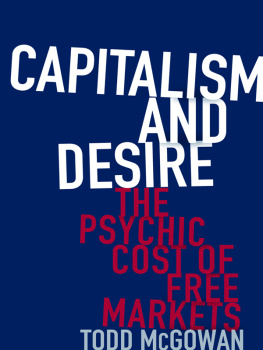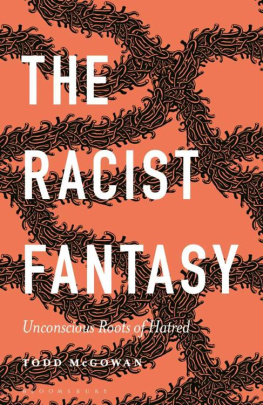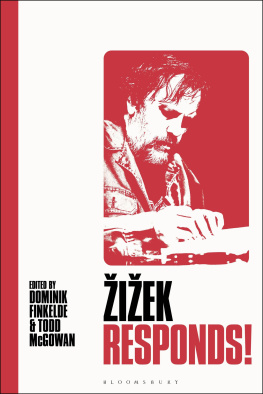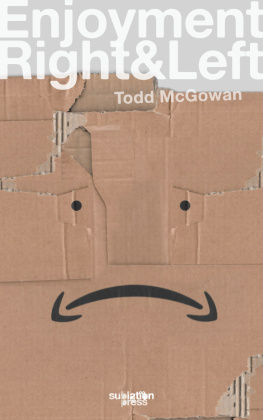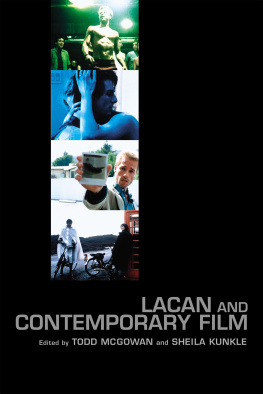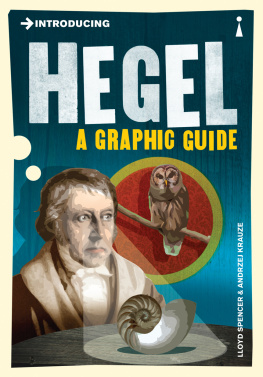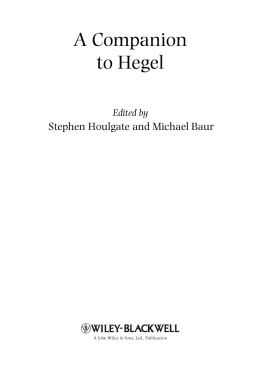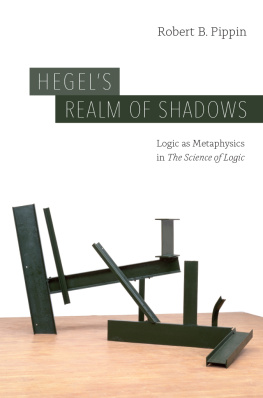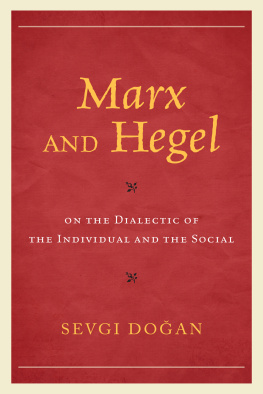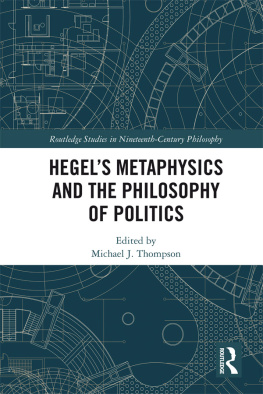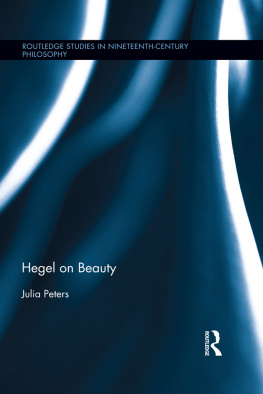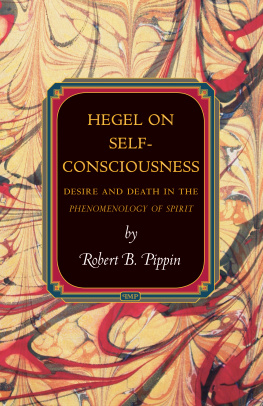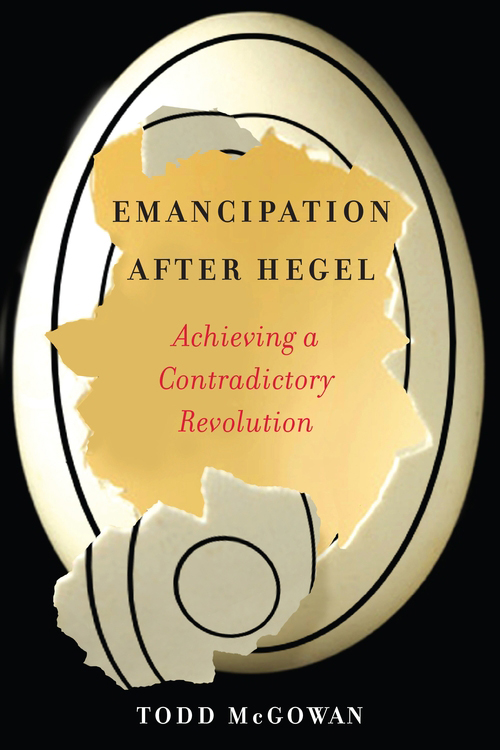Contents
Guide
Pagebreaks of the print version
EMANCIPATION AFTER HEGEL
Emancipation After Hegel
ACHIEVING A CONTRADICTORY REVOLUTION

Todd McGowan

Columbia University Press
New York
Columbia University Press
Publishers Since 1893
New York Chichester, West Sussex
cup.columbia.edu
Copyright 2019 Columbia University Press
All rights reserved
E-ISBN 978-0-231-54992-9
Library of Congress Cataloging-in-Publication Data
Names: McGowan, Todd, author.
Title: Emancipation after Hegel : achieving a contradictory revolution / Todd McGowan.
Description: New York : Columbia University Press, 2019. | Includes bibliographical references and index.
Identifiers: LCCN 2018048909 | ISBN 9780231192705 (cloth : alk. paper)
Subjects: LCSH: Hegel, Georg Wilhelm Friedrich, 17701831.
Classification: LCC B2948 .M3175 2019 | DDC 193dc23
LC record available at https://lccn.loc.gov/2018048909
A Columbia University Press E-book.
CUP would be pleased to hear about your reading experience with this e-book at .
Cover design: Mary Ann Smith
For Richard Boothby, the disciple of unknowing
CONTENTS
contain work revised from earlier publications. I am grateful to Rowman and Littlefield for the permission to reprint portions of Hegel in Love, in Can Philosophy Love? Reflections and Encounters , ed. Cindy Zeiher and Todd McGowan (London: Rowman and Littlefield, 2017), 326. Thanks also to Continental Thought and Theory for permission to reprint some of The End of Resistance: Hegels Insubstantial Freedom, Continental Thought and Theory 1, no. 1 (2016): 10027, and to Crisis and Critique for permission to reprint part of Learning to Love the End of History: Freedom Through Logic, Crisis and Critique 4, no. 1 (2017).
Thanks to Wendy Lochner at Columbia University Press. She is the most philosophically adept and brutally kind editor imaginable. I am grateful that she believes in alchemy when it comes to what I send her. Thanks also to Susan Pensak for her generous work editing the manuscript.
Dashiell and Theo Neroni, my twin sons, acted out difficult portions of the Phenomenology of Spirit for me when I found myself unable to understand what Hegel was getting at.
Thanks to my mother, Sandi McGowan, who read Hegel to me instead of childrens books when I was a small boy, despite my pleas for a normal childhood.
I am grateful for the help of Emily Bernard and Andrew Barnaby, who introduce the dialectical cut to a world allergic to it.
Thanks to Jill Delaney-Shal for giving me an early lesson in Hegel by placing me in the dialectic of master and servant in the form of a love relationship.
This project would have taken much longer if not for the generous gift of time from Dean William Falls at the University of Vermont. Bill is the only administrator Ive ever seen who could do the impossiblesuccessfully bringing the law of the heart into power.
The Theory Reading GroupJoseph Acquisto, Sarah Alexander, Bea Bookchin, Hilary Neroni, John Waldron, and Hyon Joo Yoomakes the University of Vermont habitable, despite the best efforts of those who run the place.
Thanks to Clint Burnham, Danny Cho, Joan Copjec, Jennifer Friedlander, Mattew Flisfeder, Henry Krips, Donald Kunze, Juan Pablo Lucchelli, Hugh Manon, Quentin Martin, Jonathan Mulrooney, Ken Reinhard, Frances Restuccia, Molly Rothenberg, Mari Ruti, Russell Sibriglia, Fabio Vighi, Louis-Paul Willis, and Jean Wyatt, who have always followed Hegels example, sacrificing their particularity for the sake of the universal.
Sarah Alexander generously read multiple chapters of this book and provided invaluable advice. Unfortunately, the quality of the books argument drove her from Hegel to Marx.
Slavoj ieks epochal rereading of Hegel will never be surpassed. His work is the condition of possibility for this book. He claimed that mine couldnt possibly be as long as his, which turned out to be correct.
Thanks to Adrian Johnston, whose thoughtful reading showed how I might better hide the books many errors. He pointed out just where to adjust the disguise.
Ryan Engley worked through many of the ideas in this book with me. He gained absolute knowledge by working at Wal-Mart, a laboratory of Left Hegelianism.
Thanks to Sheila Kunkle, who constantly reminds me that contradictions hide paradoxes.
Anna Kornbluhs incisive reading cut this book down to size. She was able to see the trees that the forest was hiding. Without her suggestions for reduction, it would have been even more overweight.
Walter Davis read the whole book twice, providing extensive commentary each time. I appreciate the implacability of his demands, which are those of a relentless friend.
This book would be unimaginable without Richard Boothby. Rick never failed to be astonished, even when the insights should have been ordinary. He made time for the book even when he was stuck in the middle of the ocean.
Finally, thanks to Paul Eisenstein, Walter Davis, and Hilary Neroni. I learned Hegel with Paul, struggled with Mac about what Hegel said, and was able to marry Hilary only because Hegel was unavailable.
A POSTHUMOUS CATASTROPHE
Philosophers inevitably endure catastrophes in their afterlives. It is difficult to come up with a major thinker who has escaped this fate entirely. The Catholic Church adopted Aristotle as its theological foundation during its hegemony over Europe; tyrants took up the mantle of Karl Marx; Nazis erected Friedrich Nietzsches bermensch as their ideal; and American ego psychologists proclaimed that they were practicing Freudian psychoanalysis. In the light of these catastrophes, Hegel seems to have gotten off easily. The catastrophe that befell his philosophy didnt lead to mass extermination, but it did preclude the possibility for a fair estimation of his philosophical importance.
Hegels philosophy had its catastrophe very soon after his death with the split between Left and Right Hegelians. As the Right Hegelians disappeared into history and the Left Hegelians prevailed (primarily through Karl Marx and subsequent Marxists), Hegels legacy ceased to bear the marks of his Christian theology or his enthusiasm for the state.
For over a century, this split seemed beneficent. It appeared as if the Left Hegelians had taken the fruit of Hegels thought and left behind nothing but the chaff. Not only did Left Hegelianism lead to Marxist revolutions across the planet that liberated people from oppressive situations, but it also produced some of the most important philosophers of the twentieth century, like Gyrgy Lukcs, Alexandre Kojve, Theodor Adorno, Jean-Paul Sartre, Simone de Beauvoir, and Frantz Fanon, among many others. Seen in this light, it is difficult to label the split that overran Hegels philosophy a catastrophe.
But in the aftermath of the twentieth century, the verdict ceases to be so decisive. All of the Marxist revolutions have failed, and the philosophical terrain opened up by Hegels followers has become infertile. Few still adhere to the Hegelian Marxism of Lukcs or the existentialism of Sartre. Even Adornos critical theory appears outdated in an epoch that no longer has a place for his form of theoretical resistance to the hegemony of the popular. If Hegels only legacy were that of the Left Hegelians, we would have to proclaim him a dead dog. But the failure of the nineteenth and twentieth centurys Left Hegelianism creates a contemporary opening for the rediscovery of a new version of Hegel. This is a propitious moment for returning to Hegel.


